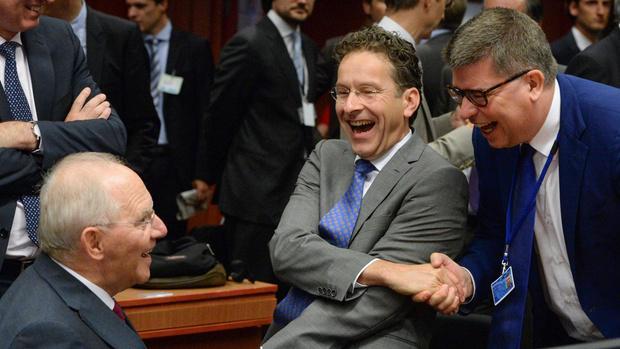Wolfgang Schäuble may heave left the finance ministry but his policy for turning the eurozone into an iron cage of austerity, that is the very antithesis of a democratic federation, lives on. What is remarkable about Dr Schäuble’s tenure was how he invested heavily in maintaining the fragility of the monetary union, rather than eradicating it in order to render the eurozone macro-economically sustainable and resilient. Why did Dr Schäuble aim at maintaining the eurozone’s fragility? Why was he, in this context, ever so keen to maintain the threat of Grexit? The simple answer is: Because a state of permanent fragility was instrumental to his strategy for using the threat of expulsion from the euro (or even of
Topics:
Yanis Varoufakis considers the following as important: Adults in the Room, English, Essays, European Crisis, Greek crisis
This could be interesting, too:
Stavros Mavroudeas writes The Greek Saga: Competing Explanations of the Greek Crisis – S.Mavroudeas, New York University, 24/3/2023
Matias Vernengo writes Leo Panitch and the Lessons from Socialist Defeats
Yanis Varoufakis writes Jamie Galbraith on DiEM-TV’s ‘Another Now’ discussing the “criminal incapacity of the elites”
Yanis Varoufakis writes A chronicle of our BLEAK TWENTIES – Cambridge Union Online

Wolfgang Schäuble may heave left the finance ministry but his policy for turning the eurozone into an iron cage of austerity, that is the very antithesis of a democratic federation, lives on.
What is remarkable about Dr Schäuble’s tenure was how he invested heavily in maintaining the fragility of the monetary union, rather than eradicating it in order to render the eurozone macro-economically sustainable and resilient. Why did Dr Schäuble aim at maintaining the eurozone’s fragility? Why was he, in this context, ever so keen to maintain the threat of Grexit? The simple answer is: Because a state of permanent fragility was instrumental to his strategy for using the threat of expulsion from the euro (or even of Germany’s withdrawal from it) to discipline the deficit countries – chiefly France.
Deep in Dr Schäuble’ thinking there was the belief that, as a federation is infeasible, the euro is a glorified fixed exchange rate regime. And the only way of maintaining discipline within such a regime was to keep alive the threat of expulsion or exit. But to keep that threat alive, the eurozone could not be allowed to develop the instruments and institutions that would stop it from being fragile. Thus, the eurozone’s permanent fragility was, from Dr Schäuble’s perspective an end-in-itself, rather than a failure.
The Free Democratic Party’s ascension will see to it that Wolfgang Schäuble’s departure will not alter the policy of doing whatever it takes to prevent the eurozone ‘s evolution into a sustainable macroeconomy. The FDP’s sole promise to its voters was to prevent any of Emmanuel Macron’s plans, for some federation-lite, from being agreed to, and for pursuing Grexit. Even worse, whereas Wolfgang Schäuble understood that austerity plus new loans were catastrophic for countries like Greece (but insisted on them as part of his campaign to discipline France and Italy), his FDP successors at the finance ministry will probably be less ‘enlightened’ believing that the ‘tough medicine’ is fit for purpose.
And so the never ending crisis of Europe’s social economy, that feeds the xenophobic political monsters, continues.
